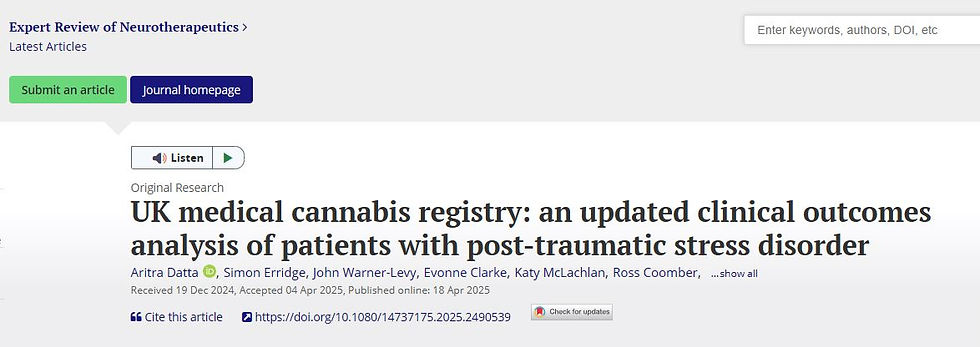Research Roundup: Apr 25, 2025
- Apr 25, 2025
- 3 min read

Best of cannabinoid science this week...
In people with PTSD, the UK Medical Cannabis Registry found that starting cannabis caused significant improvements in PTSD symptoms, anxiety, sleep quality & health-related quality of life
UK Medical Cannabis Registry An Updated Clinical Outcomes Analysis of Patients With Post‑Traumatic Stress Disorder
In people with Parkinson's disease, 12 weeks of CBD improved working memory & with no adverse effects on other symptoms
Cannabidiol and Cognitive Functions Inflammatory Markers in Parkinson’s Disease (CBD‑PD‑BRH Trial)
For treatment-resistant epilepsy, a meta-analysis of seven trials found CBD & its derivatives reduced seizures
Cannabis Derivatives and Their Synthetic Analogs for Treatment‑Resistant Epilepsy: A Systematic Review and Meta‑Analysis
And for epilepsy, data from the UK Medical Cannabis Registry found that initiating cannabis improved all health-related quality of life factors measured including sleep, anxiety & patient impression of change
UK Medical Cannabis Registry: A Clinical Outcomes Analysis for Epilepsy
And for drug-resistant epilepsy, a case series of nine people who achieved seizure freedom with individualized medical cannabis therapy
Nine Patients Report Seizure Freedom with Medical Cannabis Treatment for Drug‑Resistant Epilepsy: A Case Series
And for severe uncontrolled seizure states, 2 case reports of CBD reducing seizures up to the 6-month follow up
Effectiveness of Highly Purified Cannabidiol in Refractory and Super-Refractory Status Epilepticus: A Case Series
A book on diseases of the endocannabinoid system & therapeutic strategies
Diseases of the Endocannabinoid System
For chronic pain, a review of its efficacy as well as its cognitive & psychiatric adverse effects (nice chart on mechanisms)
Cannabinoids in Chronic Pain Management: A Review of the History Efficacy Applications and Risks
For pain & jaw disorders, a review on the therapeutic potential of oral & topical CBD
The Therapeutic Potential of Cannabidiol in the Management of Temporomandibular Disorders and Orofacial Pain
For weight loss, a review of how weight loss is linked to lower levels of endocannabinoids & the potential links to the reward system & the success of bariatric surgery
Circulating Endocannabinoids and Brain Anatomy: Unraveling the Weight Loss Connection Through Lifestyle and Surgery Approaches
For the reproductive toxicity of CBD, a review found that consumer levels posed no greater health risk than coffee or cocoa
Is CBD Harmful to Human Reproduction Even at Moderate Doses?
In a rat model of spinal cord injury, cannabis extract improved locomotor recovery, prevented secondary damage, enhanced the anti-inflammatory response, decreased inflammatory microglia (guarding immune cells of the brain) & reduced neurotoxic astrocytes (the most predominant brain support cell)
Cannabidiol / Tetrahydrocannabinol‑Enrich Extract Decreases Neuroinflammation and Improves Locomotor Outcome Following Spinal Cord Injury
In a mouse model of ALS, CBD lessened body weight loss, reinstated sociability, strengthened social recognition memory & reduced anxiety
Behavioural Effects of Oral Cannabidiol (CBD) Treatment in the Superoxide Dismutase 1 G93A Mouse Model of Amyotrophic Lateral Sclerosis
In a mouse model of the neuroinflammation of Alzheimer's disease, on how CBD modulates the IDO and cGAS‑STING pathways
Rethinking Alzheimer’s: Harnessing Cannabidiol to Modulate IDO and cGAS Pathways for Neuroinflammation Control
In rats with sepsis (an extreme immune response to infection), CBD reduced inflammatory markers & increased levels of BDNF (a key brain growth factor)
The Effect of Cannabidiol on Myokine, Cerebral and Cardiac Response in Rats with Sepsis Induced by Cecal Ligation and Punture Method
In a mouse model of obesity, oleoylethanolamide (the endocannabinoid related to satiation) normalized cholesterol levels, decreased inflammatory markers, lowered markers of apoptosis (programmed cellular suicide) & protected the liver from damage
Hepatoprotective and Antiatherosclerotic Effects of an Oleoylethanolamide‑Based Dietary Supplement in Dietary‑Induced Obesity in Mice
In a mouse model of arthritis, oleoylethanolamide (the endocannabinoid of satiation), lessened symptoms, suppressed pro-inflammatory cytokines & rebalanced immune T cells via the GPR119 receptors
Oleoylethanolamide Ameliorates Collagen‑Induced Rheumatoid Arthritis via Activation of GPR119
In a mouse model of alcohol use disorder with increased use due to social stress, oleoylethanolamide (an endocannabinoid related to food intake) decreased their ethanol consumption & had lower levels of neuroinflammatory factors
Oleoylethanolamide Effects on Stress‑Induced Ethanol Consumption A Lipid at the Crossroads Between Stress Reward and Neuroinflammation
In rat brains exposed to the toxic metal cadmium, the terpene beta-caryophyllene reduced oxidative stress, suppressed inflammation, lowered autophagy (cellular recycling) & prevented apoptosis (programmed cellular suicide)
β‑Caryophyllene Attenuates Cadmium Induced Neurotoxicity in Rats by Modulating Different Cellular Signaling Pathways



Comments